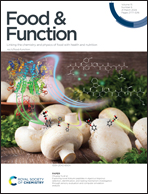A type 4 resistant potato starch alters the cecal microbiome and gene expression in mice fed a western diet based on NHANES data†
Abstract
Four major types of resistant starch (RS1–4) are present in foods, all of which can alter the microbiome and are fermented in the cecum and colon to produce short-chain fatty acids (SCFAs). Type 4 RSs are chemically modified starches, not normally found in foods, but have become a popular food additive as their addition increases fiber content. Multiple studies, in humans and rodents, have explored how different RS4 affect post-prandial glucose metabolism, but fewer studies have examined the effects of RS4 consumption on the microbiome. In addition, many RS studies conducted in rodents use high-fat diets that do not approximate what is typically consumed by humans. To address this, mice were fed a Total Western Diet (TWD), based on National Health and Nutrition Examination Survey (NHANES) data that mimics the macro and micronutrient composition of a typical American diet, for six weeks, and then supplemented with 0, 2, 5, or 10% of the RS4, Versafibe 1490™ (VF), a phosphorylated and cross-linked potato starch, for an additional three weeks. The cecal contents were analyzed for SCFA content and microbiota composition. Butyrate production was increased while branched chain SCFA production decreased. The alpha-diversity of the microbiome decreased in mice fed the TWD with 10% VF 1490 added while the beta-diversity plot showed that the 5% and 10% VF groups were distinct from mice fed the TWD. Similarly, the largest changes in relative abundance of various genera were greatest in mice fed the 10% VF diet. To examine the effect of VF consumption on tissue gene expression, cecal and distal colon tissue mRNA abundance were analyzed by RNASeq. Gene expression changes were more prevalent in the cecum than the colon and in mice fed the 10% VF diet, but the number of changes was substantially lower than we previously observed in mice fed the TWD supplemented with native potato starch (RPS). These results provide additional evidence that the structure of the RS is a major factor determining its effects on the microbiome and gene expression in the cecum and colon.



 Please wait while we load your content...
Please wait while we load your content...